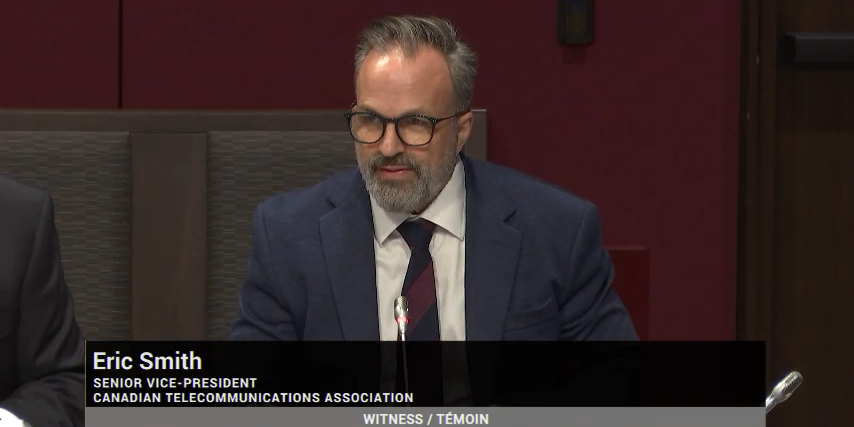
Greater penalties needed for copper theft, telecoms maintain
Regulatory | |July 9, 2025
The co-chair of the Canadian telecom network resiliency working group at the department of Innovation, Science and Economic Development (ISED) is calling on the federal government to increase the penalties for copper theft on telecom grids as the crimes become more prevalent.
Brian Lakey, whose regular job is vice-president of the reliability centre of excellence at Telus Corp., says copper thefts have skyrocketed in the past year. In the first quarter of this year, thefts from the western telecom rose 70 per cent compared to the same period a year earlier.
“The problem is the punishment doesn’t fit the crime,” he told The Wire Report. “Most of the time, thieves are charged with theft under $5,000 which really isn’t a deterrent.”
He points to California, which amended its laws to make any theft of telecom equipment over USD$950 a felony. Lakey wants to see the Canadian federal government adopt similar measures.
BCE Inc. has also seen a spike in copper thefts in the first part of 2025.
Earlier this month, Bell said in a press release that New Brunswick “has emerged as one of the nation’s hotspots for copper thefts, with more than 80 incidents this year alone.”
Year-over-year, copper theft-related incidents have gone up 23 per cent in Canada, the telecom said, adding that it has recorded more than 2,270 thefts nationwide since 2022. Such thefts now account for 88 per cent of “physical security incidents” on its network, with more than 500 cases having been reported in the first half of 2025. Ontario has been the hardest hit, it said, with 63 per cent of all incidents.
Bell also wants to see amendments to the penalties. David Joice is director of networks for Bell Canada. He too is calling for increased fines.
“We feel that the penalties aren’t severe enough,” he said in an interview. “Over the past few years, we’ve been working with all levels of government trying to increase the fines and make changes to the Criminal Code so that this type of behaviour and attacks on our critical infrastructure stop.”
Last year, Telus’ Lakey was one of several sector experts testifying before the Senate on copper theft. Later on, Rogers Communications Inc. added its voice to companies calling for stiffer penalties.
Asked to comment for this article, a Rogers spokesperson wrote, “telecommunication networks are part of Canada’s critical infrastructure. Across the industry, there has been a troubling rise in vandalism and attempted copper theft to network infrastructure, impacting Canadians who rely on our networks to stay connected. Beyond being a significant inconvenience for customers, these acts can have a serious impact on public safety.”
The company has suffered a four or five times increase in outages since 2022 due to vandalism, it offered, and said it supports calls to increase penalties.
Smaller players are not immune to the problem. Mornington Communications Co-op Ltd. is a small telecom service provider in Milverton, in southwest Ontario. It has had several incidents of heists.
General manager Ken Naylor reports that his firm has had to fence off the cable yard to protect copper and fibre. Still, it finds the ground outside the fence trampled down where people are casing the yard.
One time, a fibre line was cut by would-be thieves who possibly wondered if copper was inside. They got nothing, but Mornington’s clients suffered outages. Naylor says copper and fibre come in huge reels which crews use to rollout telecom services.
“Sometimes you can’t get a whole section done in a day, so they leave the reel in the ditch overnight and they come back to work on it,” he states. “We had a time when someone actually stole the fibre reel, which is not easy, because it’s a couple hundred pounds if not more, so they had to have a fair amount of brute strength to haul it up on the back of a truck. It was gone for about a month and then one day we were driving along a road and we saw it sitting there.”
The Canadian Telecom Association backs up its members.
“Our industry is experiencing a significant rise in copper theft and vandalism targeting telecommunications infrastructure, with incidents increasing by up to 200 per cent annually since 2022,” the group emailed The Wire Report. “These crimes lead to communities losing access to communications services, jeopardizing public safety, and disrupting local businesses and critical services. To protect the public, we need tougher criminal laws that address these serious offences.”
Provincial governments also have a role to play in preventing robberies. Scrap metal sales fall under provincial jurisdiction, as do most commercial enterprises. Lakey wants greater cooperation at the local level; scrap dealers should be aware that the material being sold to them is telecom property.
“There’s no real use outside of telecoms for 19-to-26 gauge copper wire,” he notes. “We have very specific cable built for our industry.”
The Telus executive says the thefts are a global phenomenon. In the United Kingdom, authorities state that equipment thefts cost £1 billion per year. Telus has witnessed criminals getting more brazen in their efforts.
“We’ve seen instances where the thieves have actually scaled bridges. They’re in high-viz [high-visibility] vests looking like normal crews, they go into locked manholes and pedestals to get at things,” he reports. “In extreme cases, we’ve seen a couple times where they’ve tied the copper cable to the back of their truck and just driven down the road and pop-pop-pop-pop-pop it off the poles.”
There can be an ancillary effect of such thefts. The perpetrators can cause damage to other pieces of equipment such as fibre. They also damage the poles of other utilities, such as hydro companies.
Joice says it takes on average 12 hours to reconnect Bell customers. But in rural and remote areas that are hard to get to, repairs may take days.
Lakey said Telus customers have experienced 210 million minutes of service outages since 2021.
Police are being helpful, he reported. In Alberta, the RCMP last year arrested alleged thieves in Red Deer. In Ontario, Kingston police had asked for greater powers to go after criminals.
Telecommunications companies are also stepping up to the plate. Bell has sued some of those arrested for damages following thefts.
“It is one of our methods to deter this type of action and also sometimes just trying to recoup the costs,” Joice maintains. “We spend millions of dollars every year fixing these attacks on our critical infrastructure.”
In a statement to The Wire Report, Bell said it was happy with the way the cases are proceeding.
“We are pursuing all available legal options against those who damage critical infrastructure including pursuing civil claims where appropriate,” the company wrote. “These cases are making their way through the court system and recently, we obtained one judgment for $315k.”
Lakey stresses this is not just a case of worrying about the bottom line.
“This is not really a financial issue, it’s a public safety issue,” he asserts. “When this happens, they take out telecommunication services which can really make it so that you cannot call 911 whether it’s your home phone or your mobile phone.”
Bell concedes that the issue could be moot once migration from copper to fibre is complete but that will take years, Joice says. In the meantime, deployment of copper is inflicting hardships on telecoms. Bell mentioned that in a recent filing on primary exchange services that it is required to take drastic measures to get equipment.
“Traditional copper networks have become increasingly outdated, prohibitively costly to maintain, and have generally reached end-of-life,” the company stated. “Many of the parts required to operate these networks are no longer produced by manufacturers, and the manufacturers that used to produce them no longer exist. We are therefore required to use recycled and refurbished parts sourced from secondary markets such as eBay that are highly unreliable — and even the supply of these parts is diminishing.”
The ISED working group features stakeholders from various telecoms. It was formed in the wake of the Rogers service outage in 2022.




